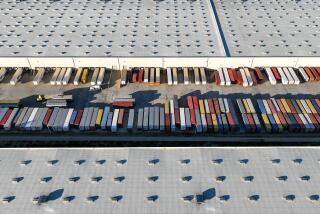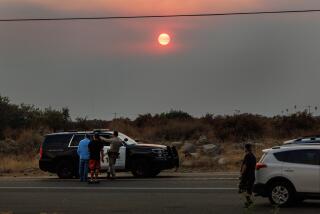AQMD Imposes New Air Quality Rules on Waste-to-Power Plants
In a unanimous vote, the South Coast Air Quality Management District board Friday moved to immediately impose new air quality requirements on five waste-to-energy plants planned in the four-county basin.
The controversial plants previously were exempted from having to meet all of the air pollution control measures required of other dischargers, such as factories.
The new requirement--though not identical to those that must be met by others--for the first time mandates that the plants’ management take whatever measures are necessary to bring about a net improvement in air quality throughout the South Coast Air Basin, which covers Los Angeles, Orange, San Bernardino and Riverside counties.
The vote was hailed by AQMD Vice Chairman Thomas F. Heinsheimer as an advance in efforts to improve air quality, while not imposing unrealistic conditions that could kill construction of needed government-run waste-to-energy projects. Without such plants, he said, the South Coast Basin would be “buried” beneath tons of garbage by the year 2000.
Public Hearing
Approval of the new requirement, which came after a daylong public hearing, represented a compromise between business interests who wanted no new controls and environmentalists who pushed for tougher ones.
Under terms of the new provisions, five waste-to-energy and co-generation plants proposed in the City of Commerce, South Gate, Puente Hills and two projects at the Spadra landfill in Pomona would be effected.
Previously, the plants, proposed by the County Sanitation Districts of Los Angeles County, were merely required to make a reasonable effort to reduce air pollution, if they could.
Unlike other sources of air pollution, the plants were exempted from mandatory requirements to reduce pollution somewhere else in the district to more than offset the new pollution they created. The reductions are called emission credits or “offsets.”
Reduce Dependence
In 1983, the Legislature exempted waste-to-energy and co-generation plants from the offset requirements as policy makers looked for ways to reduce dependence on foreign oil. In addition, lawmakers wanted to find alternatives to leaking landfills for disposing of hazardous waste and trash landfills.
The new requirement did not go as far as representatives for the Coalition for Clean Air, a Santa Monica-based environmental group, and homeowners in Hacienda Heights asked. They wanted the plants to more than offset every new ton of pollutants the plants would produce with reductions elsewhere. Moreover, they opposed substituting reductions in one kind of pollutant, such as carbon monoxide, for increased emissions in another, such as nitrogen oxides.
AQMD board member Sabrina Schiller, an activist with the Coalition for Clean Air, charged that the substitutes amounted to “unfairly violating the rights of citizens to breathe.” The board, however, gave its staff the discretion to permit such trades.
Review Action
Schiller, whose AQMD position has been on the line, was retained by the Senate Rules Committee earlier this week, at least until January when her appointment will be reviewed.
Heinsheimer said Friday the call for full offsets was “a code word for killing the projects.”
Earlier, the board rejected its staff’s proposal to impose the same offset requirements on the waste-to-energy plants that other polluters are required to meet.
Before the compromise was reached, AQMD District Counsel Curtis Coleman said that unless waste-to-energy plants were covered by the tighter rules proposed for other new sources of pollution, the clean air gains would be minimal.
The board’s reluctance to adopt the staff’s proposal moved Schiller to protest: “We are creating a double standard here. We are saying that government doesn’t have to meet the same regulations that private industry does.”
In the end, however, Schiller joined other board members in voting for the compromise.
Rejected Proposal
Meanwhile, the board rejected another proposal, opposed by oil companies and utilities, to tighten air quality requirements. The board said any new factory would have to comply with air pollution rules in effect at the time the project’s application for construction is deemed complete by the AQMD staff.
The staff had proposed that the rules in effect at the time the permit was actually issued should apply.
More to Read
Sign up for Essential California
The most important California stories and recommendations in your inbox every morning.
You may occasionally receive promotional content from the Los Angeles Times.









